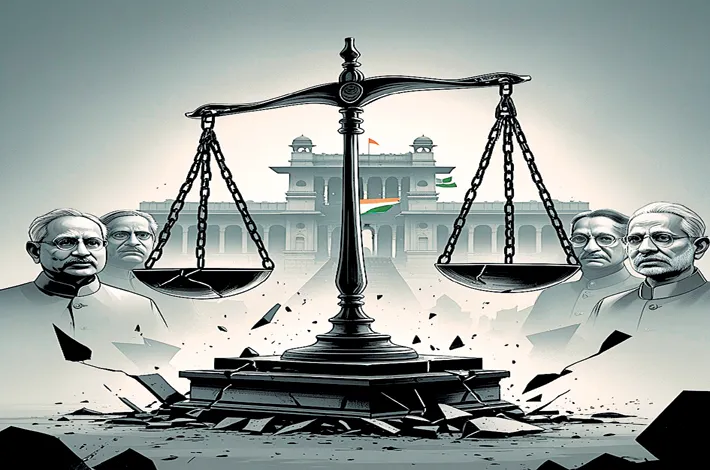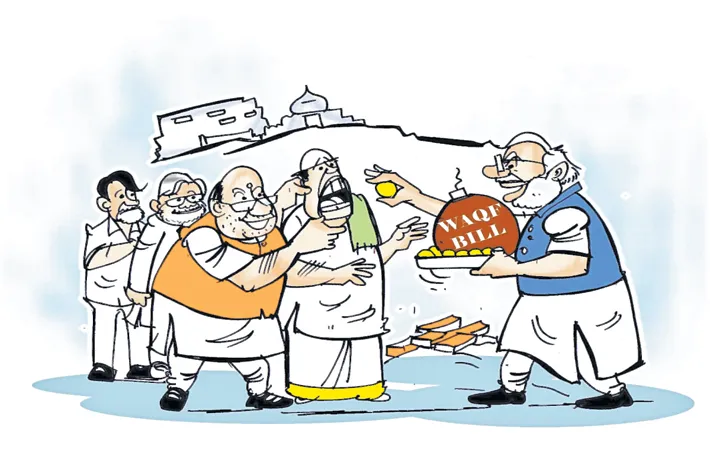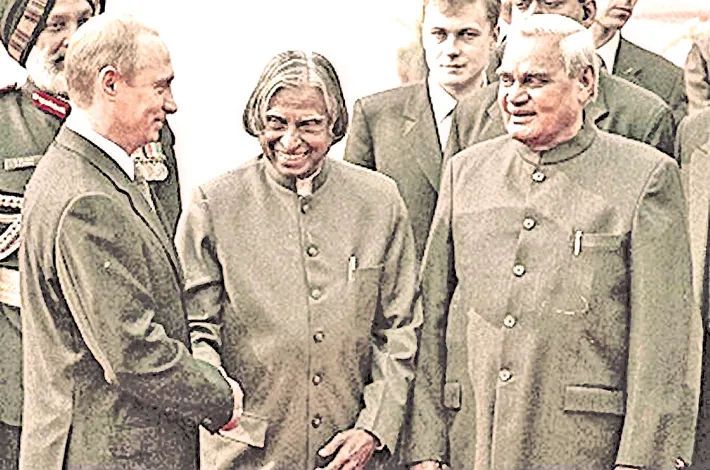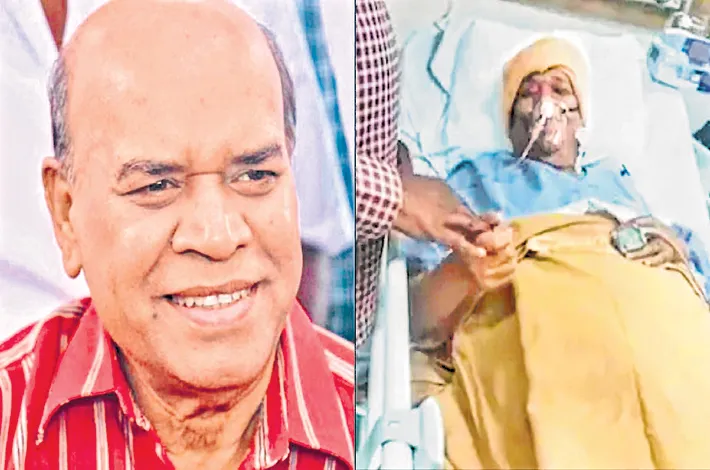Erosion of Judicial Respect in Indian Politics: a view
14-04-2025 12:00:00 AM

metro india news I hyderabad
In the annals of Indian democracy, the judiciary has long served as a cornerstone of accountability, ensuring that those in power adhere to the rule of law. Historically, Indian politicians, particularly those in high office, demonstrated a degree of respect for court verdicts, often stepping down from their posts when faced with adverse judicial rulings.
This practice, rooted in the ethos of constitutional morality, appears to be waning in contemporary times, especially among key figures such as Governors and Chief Ministers affiliated with the ruling Bharatiya Janata Party (BJP). This analysis explores the shift in political behavior toward judicial pronouncements, contrasting past deference with present defiance, and examines specific instances where BJP leaders have resisted resignation despite severe court strictures.
Historical Context: A Tradition of Judicial Respect
In the early decades of independent India, politicians generally upheld the sanctity of judicial verdicts, recognizing the judiciary’s role as an impartial arbiter. A notable example is the resignation of Punjab Chief Minister Pratap Singh Kairon in 1964. Following a judicial inquiry that found him guilty of nepotism and corruption, Kairon stepped down, setting a precedent for accountability. Similarly, in 1975, Uttar Pradesh Chief Minister H.N. Bahuguna resigned after the Allahabad High Court invalidated his election due to procedural irregularities, reflecting adherence to judicial authority even in politically turbulent times.
This respect was not limited to Chief Ministers. Union Ministers, too, bowed to judicial pressure. In 1996, Union Minister Kalpnath Rai resigned after the Supreme Court criticized his involvement in a corruption scandal. These instances underscored a broader political culture where resignations were seen as a moral and democratic obligation when courts cast aspersions on one’s conduct or legitimacy. The judiciary’s word carried weight, and stepping down was often a preemptive act to preserve institutional credibility and public trust.
This culture of accountability was further reinforced during the landmark Kesavananda Bharati case (1973), where the Supreme Court established the “basic structure doctrine,” limiting Parliament’s power to amend the Constitution. Politicians, even those in power, largely refrained from openly challenging the judiciary’s authority, recognizing its role in safeguarding democratic principles.
The Contemporary Shift: Defiance Over Deference
Fast forward to the present, and the landscape appears markedly different. The past decade has witnessed a growing trend of politicians, particularly those in influential positions like Governorships and Chief Ministerships, resisting calls to resign despite adverse court rulings. This shift is especially pronounced among BJP leaders, who have often cited political loyalty, public mandate, or procedural technicalities to justify their continuation in office.
Governors, as constitutional appointees, are expected to embody neutrality and uphold the rule of law. However, recent cases suggest a departure from this ideal. A prominent example is Tamil Nadu Governor R.N. Ravi, whose actions drew sharp rebuke from the Supreme Court in 2024. The Court declared his refusal to assent to 10 bills passed by the Tamil Nadu Assembly as “not bona fide” and set strict timelines for gubernatorial action under Article 200. Despite the 415-page judgment exposing his overreach, Ravi did not resign, continuing in his post with apparent backing from the central government.
Similarly, in Maharashtra, Governor Bhagat Singh Koshyari faced criticism for his handling of the 2019 government formation crisis. The Supreme Court, in the Shiv Sena-NCP-Congress case, questioned his decision to swear in Devendra Fadnavis as Chief Minister based on unsubstantiated claims of support, ordering a swift floor test. While Koshyari’s actions were deemed controversial, he neither resigned nor faced significant repercussions, highlighting a growing tolerance for gubernatorial defiance.
Chief Ministers, too, have shown reluctance to step down. In Madhya Pradesh, former Chief Minister Shivraj Singh Chouhan remained in office despite a 2024 defamation case that reached the Supreme Court after the Madhya Pradesh High Court refused to quash it. Though the case did not directly mandate resignation, the judiciary’s scrutiny did not prompt Chouhan to step aside, unlike his predecessors in similar situations.
Quantifying the Trend: BJP Leaders and Court Strictures
While precise numbers are difficult to ascertain due to the nuanced nature of judicial strictures, at least three prominent BJP-affiliated Governors—R.N. Ravi (Tamil Nadu), Bhagat Singh Koshyari (Maharashtra), and Jagdeep Dhankhar (West Bengal, before his elevation to Vice President)—have faced significant criticism from High Courts or the Supreme Court since 2019 for actions ranging from delaying bills to interfering in state politics. None resigned following these rulings. Among Chief Ministers, Shivraj Singh Chouhan and Devendra Fadnavis (during his brief 2019 stint) encountered judicial scrutiny but continued in their roles, with Fadnavis returning as Chief Minister later.
In contrast, historical data suggests that between 1950 and 2000, at least a dozen Chief Ministers and Union Ministers resigned following adverse court rulings or inquiries, including figures like Kairon, Bahuguna, and Rai. This stark difference underscores a decline in the political norm of stepping down to uphold judicial and public accountability.
Implications for Indian Democracy
The reluctance of contemporary BJP leaders to resign despite court strictures raises concerns about the erosion of judicial authority and democratic checks. Governors, meant to act as constitutional bridges between states and the Union, risk becoming partisan actors, as seen in Tamil Nadu and Maharashtra. Chief Ministers, by clinging to power, undermine the moral weight of judicial pronouncements, potentially weakening public faith in institutions.
Historically, resignations in the face of adverse rulings reinforced the judiciary’s role as a guardian of democracy. Today’s defiance, however, suggests a prioritization of political expediency over constitutional propriety. While the BJP’s centralized leadership and electoral dominance may embolden such resistance, it risks setting a precedent where judicial verdicts are seen as negotiable rather than binding.
Conclusion
The contrast between past and present Indian politics reveals a troubling shift. Where once leaders like Kairon and Bahuguna respected court verdicts by resigning, today’s Governors and Chief Ministers, particularly from the BJP, often remain entrenched despite severe strictures. The cases of R.N. Ravi, Bhagat Singh Koshyari, and others illustrate this trend, with at least three Governors and two Chief Ministers in recent years defying calls for accountability. This erosion of judicial respect threatens the delicate balance of India’s democratic framework, calling for renewed emphasis on constitutional morality to restore the judiciary’s sanctity.
Neelam Sanjiva Reddy
The then Chief Minister of Andhra Pradesh, resigned voluntarily on February 20, 1964, following unfavorable observations made by the Supreme Court in the Bus Routes Nationalisation case. This decision showcased Reddy's commitment to upholding the rule of law and respecting judicial scrutiny. Reddy's resignation highlights the significance of judicial oversight in governance. Although the specifics of the Supreme Court's observations are not detailed, it's clear that Reddy prioritized integrity and accountability in governance. This incident demonstrates his dedication to public service and responsible leadership.
Lal Bahadur Shastri
India’s Railway Minister, tendered his resignation following two devastating train accidents in 1956, setting a rare example of political accountability. The first incident occurred in August at Mahbubnagar, Andhra Pradesh, where 112 lives were lost due to a bridge collapse caused by flooding. Shastri offered to resign, taking moral responsibility, but Prime Minister Jawaharlal Nehru persuaded him to stay, citing his exemplary service.
However, just three months later, another catastrophe struck. On November 23, the Tuticorin Express derailed near Ariyalur, Tamil Nadu, plunging into the Marudaiyar River. The accident, triggered by flood-damaged bridge pillars, claimed over 150 lives, making it one of India’s deadliest rail disasters at the time. Overwhelmed by the tragedy, Shastri resubmitted his resignation, insisting it be accepted. Despite opposition from Congress leaders, Nehru forwarded it to President Rajendra Prasad, praising Shastri’s integrity.
Shastri’s decision, announced on November 26, 1956, resonated nationwide, earning him respect for prioritizing ethical responsibility over political position. His resignation underscored the need for improved railway safety, leaving a lasting legacy in Indian governance.
Kona Prabhakara Rao
Resigned as Governor of Maharashtra on April 2, 1986, due to his involvement in the Bombay University MD exam scandal. The scandal centered on allegations that Maharashtra Chief Minister Shivajirao Patil-Nilangekar manipulated the MD (Obstetrics and Gynecology) exam results to favor his daughter, Chandrakala, who had failed the exam multiple times.
Rao was implicated for attempting to influence the Bombay University vice-chancellor and other officials to support the Chief Minister’s actions. The Bombay High Court found evidence of result manipulation, and public outcry followed. Rao’s tenure was already controversial, with accusations of misusing his office for personal gain, which amplified the pressure for his resignation.








